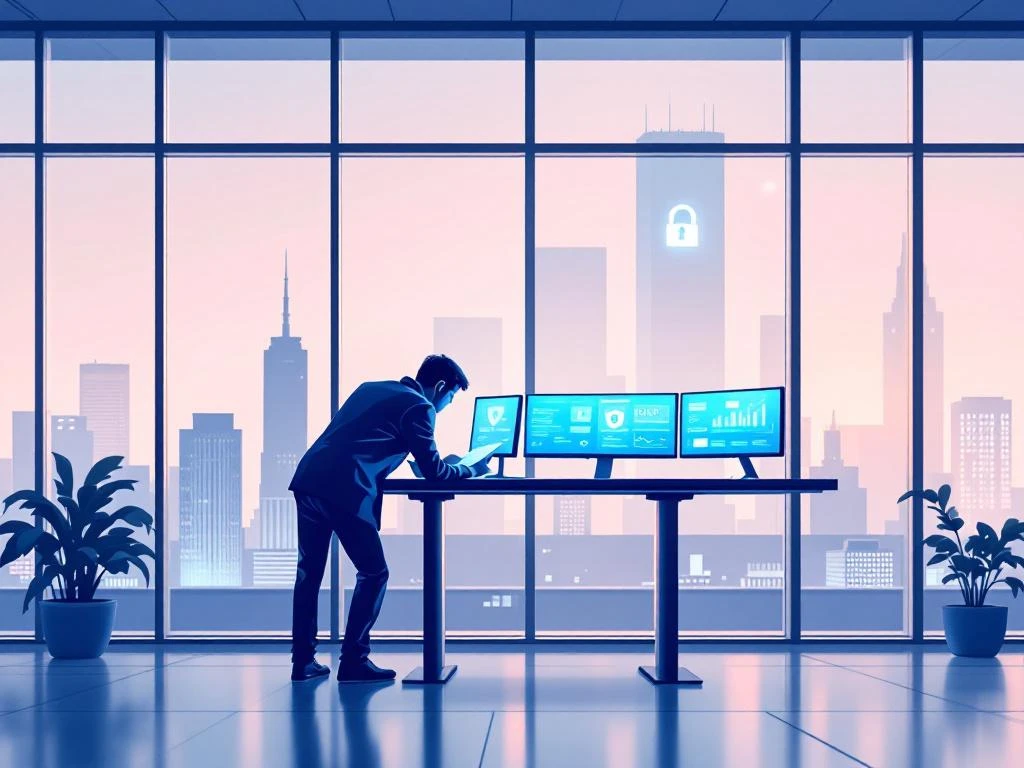

-
UK: +44 203 8876 770
US: 315 508 6500 - cybersecurity@thisisiceberg.com
-
8 Devonshire Square, London, EC2M 4YJ

The demand for skilled cybersecurity professionals continues to outpace supply. Organizations worldwide are not only competing to attract top security talent but struggling to retain these valuable team members once they’re on board. With an ever-widening skills gap and increasing cyber threats, keeping your security experts engaged and committed has never been more important. The true cost of turnover extends beyond recruitment expenses—it impacts your security posture, team morale, and business continuity. Let’s explore proven strategies to help you retain your cybersecurity professionals in today’s highly competitive marketplace.
Understanding the root causes of cybersecurity talent turnover is the first step toward improving retention. While competitive salary offers from rival organizations often trigger departures, the underlying reasons typically run much deeper.
Professional stagnation ranks among the top concerns for security specialists. When cybersecurity professionals feel their skills aren’t being utilized or developed, they begin looking elsewhere. Many security experts leave roles where they’ve been pigeonholed into repetitive tasks or limited responsibilities that don’t match their capabilities or interests.
Limited career advancement opportunities also drive turnover. Security professionals want clear paths for growth—whether that means advancing into leadership, specializing in emerging areas like cloud security, or gaining broader exposure across the security landscape. Without visible progression routes, they’ll seek employers who offer clearer advancement possibilities.
The high-pressure nature of security work creates significant burnout risk. Constant alert fatigue, irregular hours during incident response, and the weight of protecting organizational assets take a psychological toll. When organizations fail to address these pressures through reasonable workloads and support systems, security teams experience higher turnover rates.
Notably, many cybersecurity professionals report feeling undervalued or misunderstood by leadership. When executives view security primarily as a cost center rather than a business enabler, it creates friction and frustration among security teams trying to implement robust protections.
While competitive compensation remains important, cybersecurity professionals increasingly prioritize other factors when deciding whether to stay with an organization. Understanding these non-monetary motivators can help you develop more effective retention strategies.
Work-life balance has emerged as a critical factor. The always-on nature of security work makes reasonable hours, flexible scheduling, and appropriate on-call rotations particularly valuable. Security professionals recognize the importance of their role but also need sustainable workloads to remain effective and avoid burnout.
Meaningful work that directly impacts the organization’s security posture is highly motivating. Security experts want to see their recommendations implemented and their expertise respected. They thrive when allowed to tackle challenging security problems and contribute to the organization’s overall resilience.
Access to ongoing learning opportunities ranks high on security professionals’ priority lists. The rapidly evolving threat landscape means that staying current requires continuous education. Organizations that support professional development through training budgets, conference attendance, and time for skill-building show their commitment to their security teams’ growth.
Many cybersecurity experts also value working in organizations where security is embraced as a core value rather than treated as an afterthought. When leadership demonstrates genuine commitment to security through appropriate funding, executive support, and integration of security into business processes, retention rates typically improve.
Creating defined advancement opportunities specifically for cybersecurity professionals requires thoughtful planning and investment. Organizations that excel at retention typically develop structured career frameworks that address the unique progression needs of security specialists.
Start by establishing clear technical and leadership tracks that acknowledge different career aspirations. Some security professionals aim for technical mastery and specialized expertise, while others seek management responsibilities. Dual-path career models that value both trajectories equally help retain talent with diverse goals.
Implement skills-based progression frameworks that map out the competencies needed at each career level. This clarity helps security professionals understand what’s required to advance and gives them specific development targets. Regular skills assessments and feedback provide ongoing guidance about growth areas.
Mentorship programs that connect junior security staff with experienced professionals accelerate development and strengthen retention. These relationships provide valuable guidance, institutional knowledge transfer, and support navigating organizational dynamics. Formal or informal mentoring initiatives signal your investment in long-term professional development.
Consider creating “special projects” opportunities that allow team members to explore emerging security areas or lead initiatives aligned with their interests. These assignments break routine monotony while building valuable new skills and visibility within the organization.
For organizations without extensive internal advancement options, creating growth through expanded responsibilities, cross-functional experience, or regional/global exposure can provide meaningful progression while keeping valuable security talent engaged.
The daily environment your security professionals experience dramatically impacts retention. Building a positive, supportive culture requires intentional effort but yields significant rewards in team stability and performance.
Foster psychological safety where team members can raise concerns, report incidents, and suggest improvements without fear of blame. Security work inherently involves identifying vulnerabilities and potential problems—professionals need to know they won’t face negative consequences for delivering difficult messages.
Implement recognition programs that celebrate both security wins and proactive risk mitigation. Unlike other IT functions where successful projects have visible outcomes, effective security work often prevents problems that never materialize. Finding ways to acknowledge this “invisible” success reinforces value and contribution.
Create collaborative problem-solving environments where security challenges become team opportunities rather than individual burdens. Regular brainstorming sessions, tabletop exercises, and cross-functional security reviews distribute workload while leveraging collective expertise.
Develop communication channels that keep security professionals connected to broader business objectives. Understanding how their work supports organizational goals provides context and purpose. Regular updates from leadership about security’s impact help team members see the value of their contributions.
Consider implementing team-building activities specifically designed around security themes, such as capture-the-flag competitions or collaborative security challenges. These events build camaraderie while sharpening skills in an engaging format.
The relentless nature of cybersecurity work creates significant burnout risk. Proactive measures to manage this pressure are essential for long-term retention of your security talent.
Implement workload management practices that distribute security responsibilities across the team. Establish clear priorities that help professionals focus on high-impact activities rather than trying to address every possible security concern simultaneously.
Create sustainable on-call protocols with fair rotations and adequate compensation. Incident response burnout is a major retention challenge in security teams. Consider implementing follow-the-sun models for global organizations or creating secondary backup schedules to provide support during major incidents.
Provide mental health resources specifically tailored to high-pressure security roles. This might include stress management training, access to counseling services, or regular wellness check-ins. Normalizing discussions about the psychological impact of security work reduces stigma around seeking support.
Encourage and enforce vacation time to ensure security professionals fully disconnect. In teams with constant threat monitoring responsibilities, create coverage plans that allow team members to truly step away during time off rather than remaining “on-call” during vacations.
Consider implementing periodic rotations between different security functions to provide variety and prevent stagnation. Moving between areas like vulnerability management, threat intelligence, and security operations can refresh perspectives while building broader expertise.
Implementing formal measurement processes helps identify retention risks before they lead to departures. Regular assessment creates accountability and enables data-driven improvements to your retention strategy.
Conduct anonymous engagement surveys specifically designed for security teams. These should explore satisfaction with technical challenges, career growth, team dynamics, and leadership support. Comparing results against broader IT or organizational benchmarks helps identify security-specific concerns.
Implement regular “stay interviews” with security team members to understand what keeps them engaged and what might cause them to leave. Unlike exit interviews that capture data too late, stay interviews provide actionable insights while retention intervention is still possible. Looking to hire new cybersecurity talent is always more resource-intensive than retaining your current team.
Track key metrics like security team turnover rates, time-to-fill security vacancies, and internal promotion percentages. These quantitative measures complement qualitative feedback and highlight systemic issues requiring attention.
Create feedback loops that demonstrate how employee input translates to workplace improvements. When security professionals see their suggestions implemented, it builds trust and reinforces their value to the organization.
Regularly benchmark your security compensation, benefits, and career opportunities against market standards. This proactive approach helps ensure your retention strategy remains competitive as market conditions evolve.
Retaining top cybersecurity talent in today’s competitive market requires a multifaceted approach that goes beyond compensation. By addressing the core needs of security professionals—meaningful work, growth opportunities, supportive culture, sustainable workloads, and genuine recognition—organizations can significantly improve retention rates.
At Iceberg, we understand the unique challenges of building and maintaining elite cybersecurity teams. Our specialized recruitment expertise helps organizations not only find exceptional security talent but also implement retention strategies that work in today’s competitive landscape.
| Retention Factor | Implementation Strategy | Expected Impact |
|---|---|---|
| Career Progression | Dual technical and leadership paths with clear advancement criteria | Improved long-term retention and skill development |
| Work-Life Balance | Structured on-call rotations and workload management | Reduced burnout and increased job satisfaction |
| Learning Opportunities | Dedicated training budgets and time for professional development | Enhanced skills and improved security capabilities |
| Team Culture | Recognition programs and psychological safety initiatives | Stronger team cohesion and improved knowledge sharing |
If you are interested in learning more, reach out to our team of experts today.













